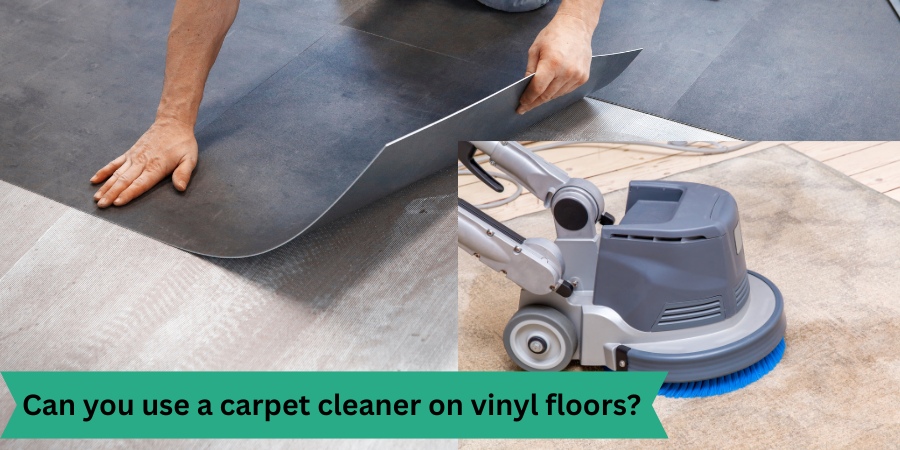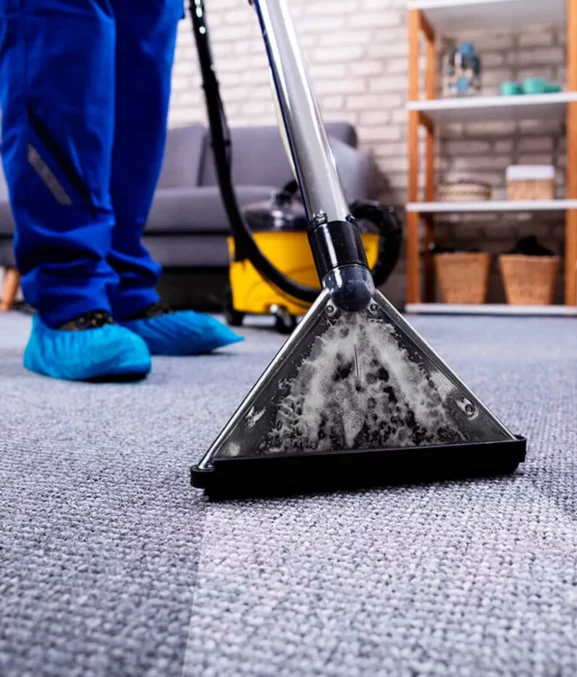Can you use a carpet cleaner on vinyl floors?
Vinyl flooring is a top choice for many homeowners due to its affordability, durability, and low maintenance. However, keeping vinyl floors clean and looking their best can sometimes raise questions—one of the most common being, “Can you use a carpet cleaner on vinyl floors?“

In this comprehensive guide, we’ll explore whether carpet cleaners are suitable for vinyl flooring, what potential risks they pose, and the best practices to maintain your vinyl floors without causing damage.
What Is Vinyl Flooring?
Vinyl flooring is a versatile, synthetic material that mimics the appearance of natural materials like wood, stone, or tile. Known for its resilience, water resistance, and ease of maintenance, vinyl is available in two main forms:
- Vinyl Plank Flooring: Resembling hardwood, vinyl planks offer realistic wood-like textures and patterns while being more durable and water-resistant than real wood.
- Vinyl Tile Flooring: Vinyl tiles replicate the look of ceramic or stone tiles but with added comfort underfoot and easier maintenance.
Can You Use a Carpet Cleaner on Vinyl Floors?
Using a carpet cleaner on vinyl floors might seem convenient, especially if you already own one. However, it’s important to understand that carpet cleaners are specifically designed for deep cleaning carpets, which are much different in texture and material than vinyl flooring. Here’s why using a carpet cleaner on vinyl floors might not be the best idea:
The Risks Involved
- Excess Moisture: Carpet cleaners typically use large amounts of water and strong suction to clean carpets. Vinyl floors, while water-resistant, can be damaged by excess moisture. Water can seep into the seams or edges, leading to warping, swelling, or mold growth beneath the flooring.
- Harsh Chemicals: Many carpet cleaners contain strong chemicals that are designed to break down stains in carpets. These chemicals can be too abrasive for vinyl floors, potentially causing discoloration, fading, or surface damage.
- Scratching and Scuffing: The brushes and high suction power of a carpet cleaner could leave scratches or scuffs on the surface of vinyl flooring, particularly if the machine is heavy or not designed for hard surfaces.
Safer Alternatives for Cleaning Vinyl Floors
It’s better to use methods and products specifically designed for them to maintain the beauty and longevity of your vinyl floors. Here are some effective alternatives:
1. Regular Sweeping and Dusting
The simplest and most effective way to clean vinyl floors is by regularly sweeping or vacuuming. This prevents dirt and debris from accumulating and scratching the surface. Use a soft-bristle broom or a vacuum cleaner with a hard floor setting.
2. Damp Mopping with a Mild Solution
For a deeper clean, damp mopping with a mild solution is ideal. Mix a few drops of dish soap or a specialized vinyl floor cleaner with warm water. Use a microfiber mop to clean the floor, wringing out excess water to avoid soaking the vinyl. After mopping, go over the floor with a clean, damp mop to remove any soapy residue.
3. Spot Cleaning Stubborn Stains
If you encounter stubborn stains, use a gentle approach. A soft cloth dampened with a mixture of water and white vinegar can effectively clean most stains without harming the vinyl. For tougher spots, a paste made from baking soda and water can be gently rubbed on the stain and then wiped away.
Best Practices for Maintaining Vinyl Floors
To keep your vinyl floors looking their best, it’s essential to follow a regular maintenance routine and take preventative measures:
1. Use Door Mats
Place mats at entryways to trap dirt, moisture, and debris before they can be tracked onto your vinyl floors. This simple step helps prevent scratches and keeps your floors cleaner for longer.
2. Furniture Protectors
Install felt pads under furniture legs to avoid scratches or dents. When moving heavy furniture, lift it instead of dragging it across the floor to prevent damage.
3. Avoid Harsh Cleaners
Stay away from abrasive cleaners, wax, or polish that can dull the finish of your vinyl floors. Stick to products specifically designed for vinyl flooring.
4. Regular Maintenance
Incorporate a weekly or bi-weekly cleaning routine that includes sweeping, mopping, and spot cleaning. This consistent care will help your vinyl floors retain their shine and durability over time.
When to Seek Professional Help
If your vinyl floors suffer from severe stains, scratches, or damage that regular cleaning can’t fix, it might be time to call in a professional. Floor care experts have specialized tools and knowledge to restore your floors without causing further harm.
Conclusion
So, can you use a carpet cleaner on vinyl floors? While it’s technically possible, it’s not recommended due to the potential risks involved. Instead, stick to safer, more effective cleaning methods tailored to vinyl flooring. With the right care, your vinyl floors can remain beautiful and durable for years to come.
Need help keeping your vinyl floors in top condition? Contact us today for expert cleaning services and a free quote!
FAQs
1. Will using a carpet cleaner damage my vinyl flooring?
Yes, using a carpet cleaner on vinyl floors can cause damage, such as water seepage, discoloration, or scratches. It’s best to avoid using carpet cleaners on vinyl and opt for vinyl-specific cleaning methods instead.
2. What’s the best way to clean vinyl floors?
The best way to clean vinyl floors is by sweeping regularly, mopping with a mild detergent solution, and spot-cleaning stains with gentle, non-abrasive products.
3. Can I steam-clean vinyl floors?
No, steam cleaning is not recommended for vinyl floors as the high heat and moisture can damage the vinyl and lead to warping or peeling.
4. Are there specific vinyl floor cleaners I should use?
Yes, use cleaners specifically labeled for vinyl floors. These products are designed to effectively clean without harming the surface or finish.

